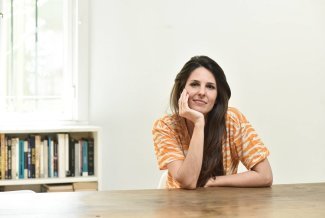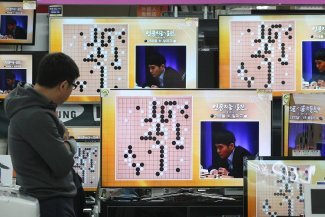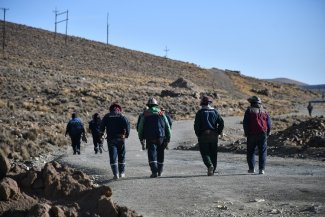“There are some amazing sides to the use of the internet and social media: never before have we had access to so much information and culture. I think it’s important not only to control how many hours we spend using technological devices but, above all, to be discerning about what kind of content we look at,” says Castellanos, photographed here.
Nazareth Castellanos has a degree in theoretical physics and a PhD in neuroscience from the Faculty of Medicine at the Autonomous University of Madrid (UAM) and has spent over 20 years researching brain activity at prestigious universities such as King’s College London and the Max Planck Institute in Germany. In recent years, she has focused on what happens in the brain when we meditate and the relationship between the brain and the rest of the body. Aside from publishing the results of her laboratory research in scientific journals, she also widely shares her work through her social media networks, lectures, courses and books, such as El espejo del cerebro (The Mirror of the Brain) published by La Huerta Grande in 2021. We talked to her about all this, and much more, via videoconference.
Your outreach work establishes a dialogue between scientific knowledge, Eastern philosophy and the spiritual realm, challenging binary conceptions and scientific dogma – already superseded by physics – that radically separates mind and body. This has many ramifications, such as analysing the link between the brain and other parts of the body, particularly the heart and the intestine.
It is important for us to understand that this binary view, which categorically separates body and mind, is actually quite new. In a few months, a book of mine will be published in which I review the history of scientific medicine, which began in Ancient Greece. And if we look back at Hippocrates or Galen, the fathers of this medicine, we see that they already have the idea that mind and body are related, that the mind is not only the brain. Hippocrates considers the brain to be a privileged organ, but he does not exclude the rest of the body from psychology. The fragmented view emerged in the 17th century, with René Descartes, and although it brought with it a number of major benefits, such as the consolidation of the scientific method, what we cannot do is deny the other. What I was seeing is that accessing our mental states is often very difficult: it is easier to enter through the body, to start meditating by paying attention to the breath and bodily sensations. It is easier to change everyday habits than to change mindsets. It makes no sense to sit and meditate for hours and then have a terrible diet, a sedentary lifestyle or habits that punish the body. We have to find a balance between mind and body; it is not about unification but dialogue.
You cite an experiment in which a group of diabetics are given drinks: some are labelled ‘sugar-free’ and some are labelled ‘with sugar’. None of the drinks, in fact, have sugar in them, but the blood sugar levels varied according to what was written on the label. So, what we think has an impact on our organism and, similarly, our diet influences how we think, and even how we behave.
Absolutely. As Saint Augustine said, we are made of soil that is hard to cultivate. If we do not feed it properly, we cannot expect much fruit. Hildegard von Bingen, a physician from the Middle Ages who practised medicine in a holistic way, using music and plants, pointed to the error of sacrificing the body, through flagellation, to reach ascension. How can we hope for a calm mindset if we cultivate that soil with fertilisers that only bring out weeds? I often tell of how, when I lived in Madrid, I used to see people having breakfast on the metro in the morning and I would think: ‘My goodness, these people are going to have a hard time getting through the day’. There is ample scientific evidence of the link between the gut-brain axis and how it influences our behaviour, our relationships with others and learning mechanisms: that is why nutrition during pregnancy and childhood is so important. Without going to extremes, of course: as with everything, balance is best.
Talking of bad habits, there are those who warn of our misuse of new technologies, especially social media and other applications that scatter our attention. What’s more, some scientists are already talking about the internet soon being connected to our brains, generating something like cyborgs, a hybrid of machine and organism. What is your view on this?
Regarding the first part of your question, I think that the press often gives too negative a view. There are some amazing sides to the use of the internet and social media: never before have we had access to so much information and culture. I think it’s important not only to control how many hours we spend using technological devices but, above all, to be discerning about what kind of content we look at. I do not, however, agree with the technological invasion of the human body that you spoke of; that’s posthumanism. I believe we should invest less in artificial intelligence and more in natural intelligence. The advantage, I believe, is that we are likely to see a humanism emerge in response to that posthumanism, and it will be very enriching.
Another fundamental idea is that the brain does not forget, but substitutes. We cannot force ourselves to stop thinking about something; it has the opposite effect. As a journalist, this makes me think about the mistakes that can be made when writing about concepts such as climate change and the ecological crisis: very negative approaches can reinforce what they are trying to combat.
I think that, as journalists, you have a huge social role that you sometimes neglect. I fully understand when someone tells me that they would rather watch gossip shows than a news programme that constantly tells us how horrible humankind is. Because what happens is that the news is exceptional; it wouldn’t be news, otherwise. So, something terrible happens and, as it is the only thing that is shown, our internal representation of reality is based solely on this information. It would be different if you gave that news but also made it clear that a huge part of humankind is good. To give an example: studies show that the most successful smoking cessation campaigns are those with positive messages; instead of ‘Smoking kills’, for example, ‘You will be fitter if you stop smoking’. The image we have of ourselves is important; if it is too defeatist, change is difficult.
Similarly, it would be interesting if our education system were to teach us how the brain and emotions work...
Absolutely. In Greece, but also in other cultures, the maxim is ‘Know thyself’. I have studied for 30 years and no one has ever told me: observe how you are, how your body reacts, how you regulate your emotions. The education system should be more open to the intimacy of the self; and great contemporary philosophers are already emphasising this.
Meditation is a fundamental part of your research. What does it show us about consciousness, about how the division between the conscious and the unconscious works?
It shows us that almost everything is a constant waltz between the voluntary and the involuntary, between the conscious and the unconscious. When I meditate, I look at myself; it’s not about analysing, it’s about observing. Neuroscience shows us what happens in the brain and how inner observation modifies brain activity, certain areas age more slowly and there is a correlation with certain mental health and psychological wellbeing indicators. In conclusion: let’s stop for a while and, instead of operating so many machines, let’s dedicate some time to that inner observation. What the ancients knew is now proven by science: a mind that wanders is an unhappy mind.
Finally, I would like to talk about the differences in the brains of men and women: how much gender bias and how much scientific evidence underlies these differences?
I am doing research on this at the moment, and what science shows is that there are differences between men and women. Brain activity is pretty much the same until the start of the hormonal processes during adolescence, and as of then, there are many differences. On a cognitive level, we have the same capacities for memory, attention and learning; but the fact that we can do the same things does not mean that we have the same brain: we arrive at the same result with neural networks that are different. This difference gives rise to nuances that enrich humankind in general: there are things that seem to evolve more optimally in men and others in women. Although we are very similar in cognitive terms, men have greater capacities for coordination and movement, while women are more capable in the areas of social cognition and empathy. There are studies that show brain activity in reaction to images of people experiencing different emotions: in men, two areas of the brain are activated; in women, nine. Moreover, what science is showing is that these differences are not just cultural but phylogenetic and ontogenetic. Obviously, I am talking about averages but, in any case, these are differences that enrich the human species and should not be hidden in the name of equality. Equality should not destroy diversity: equality yes, but of rights. If women are better able to predict and understand the state of another person, this is fundamental at leadership level. Louann Brizendine, a pioneer in research on gender differences in the brain, puts it like this: as women, we are here to keep social harmony. I find that mission an honour and, I believe, now that women are increasingly present in the world of work, that’s a place we can contribute from too.













